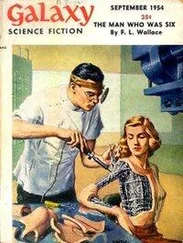“Why, Harrington!” cried the faceless man, who now had taken on a face. “How nice that you dropped in! It’s incredible that the two of us…”
“Yes, isn’t it,” said Harrington.
He scarcely knew he said it. It was, he realized, an automatic thing to say, a putting up of hands to guard against a blow, a pure and simple defense mechanism.
Madison was on his feet now and coming around the desk to greet him, and if he could have turned and run, Harrington would have fled. But he couldn’t run; he was struck and frozen; he could make no move at all beyond the automatic ones of austere politeness that had been drilled into him through thirty years of simulated aristocratic living.
He could feel his face, all stiff and dry with the urbane deadpan that he had affected—and he was grateful for it, for he knew that it would never do to show in any way that he had recognized the man.
“It’s incredible that the two of us have never met,” said Madison, “I’ve read so much of what you’ve written and liked so much everything I’ve read.”
“It’s good of you to say so,” said the urbane, unruffled part of Harrington, putting out his hand. “The fault we have never met is entirely mine. I do not get around as much as I really should.”
He felt Madison’s hand inside his own and closed his fingers on it in a sense of half-revulsion, for the hand was dry and cold and very like a claw. The man was vulture-like—the tight, dessicated skin drawn tight across the death-head face, the piercing, restless eyes, the utter lack of hair, the knife-like slash of mouth.
“You must sit down,” said Madison, “and spend some time with me. There are so many things we have to talk about.”
There was just one empty chair; all the others overflowed with books. Harrington sat down in it stiffly, his mouth still dry with fear.
Madison scurried back behind the desk and hunched forward in his chair.
“You look just like your pictures,” he declared.
Harrington shrugged. “I have a good photographer—my publisher insists.”
He could feel himself slowly coming back to life, recovering from the numbness, the two of him flowing back together into the single man.
“It seems to me,” he said, “that you have the advantage of me there. I cannot recall I’ve ever seen your picture.”
Madison waved a waggish finger at him. “I am anonymous,” he said. “Surely you must know all editors are faceless. They must not intrude themselves upon the public consciousness.”
“That’s a fallacy, no doubt,” Harrington declared, “but since you seem to value it so much, I will not challenge you.”
And he felt a twinge of panic—the remark about editorial facelessness seemed too pat to be coincidental.
“And now that you’ve finally come to see me,” Madison was saying, “I fear it may be in regard to an item in the morning papers.”
“As a matter of fact,” Harrington said smoothly, “that is why I’m here.”
“I hope you’re not too angry.”
Harrington shook his head. “Not at all. In fact, I came to thank you for your help in making up my mind. I had considered it, you see. It was something I told myself I should do, but…”
“But you were worried about an implied responsibility. To your public, perhaps; perhaps even to yourself.”
“Writers seldom quit,” said Harrington. “At least not voluntarily. It didn’t seem quite cricket.”
“But it was obvious,” protested Madison. “It seemed so appropriate a thing for you to do, so proper and so called-for, that I could not resist. I confess I may have wished somewhat to influence you. You’ve tied up so beautifully what you set out to say so many years ago in this last book of yours that it would be a shame to spoil it by attempting to say more. It would be different, of course, if you had need of money from continued writing, but your royalties—”
“Mr. Madison, what would you have done if I had protested?”
“Why, then,” said Madison, “I would have made the most abject apology in the public prints. I would have set it all aright in the best manner possible.”
He got up from the desk and scrabbled at a pile of books stacked atop a chair.
“I have a review copy of your latest book right here,” he said. “There are a few things in it I’d like to chat about with you.”
He’s a clue, thought Harrington, watching him scrabble through the books—but that was all he was. There was more, Harrington was sure, to this business, whatever it might be, than Cedric Madison.
He must get out of here, he knew, as quickly as he could, and yet it must be done in such a manner as not to arouse suspicion. And while he remained, he sternly warned himself, he must play his part as the accomplished man of letters, the final gentleman.
“Ah, here it is!” cried Madison in triumph.
He scurried to the desk, with the book clutched in his hand.
He leafed through it rapidly.
“Now, here, in chapter six, you said…”
The moon was setting when Harrington drove through the massive gates and up the curving driveway to the white and stately house perched upon its hill.
He got out of the car and mounted the broad stone steps that ran up to the house. When he reached the top, he halted to gaze down the moon-shadowed slope of grass and tulips, whitened birch and darkened evergreen, and he thought it was the sort of thing a man should see more often—a breathless moment of haunting beauty snatched from the cycle that curved from birth to death.
He stood there, proudly, gazing down the slope, letting the moonlit beauty, the etching of the night soak into his soul.
This, he told himself, was one of those incalculable moments of experience which one could not anticipate, or afterwards be able to evaluate or analyze.
He heard the front door open and slowly turned around.
Old Adams stood in the doorway, his figure outlined by the night lamp on the table in the hall. His snow-white hair was ruffled, standing like a halo round his head, and one frail hand was clutched against his chest, holding together the ragged dressing gown he wore.
“You are late, sir,” said Adams. “We were growing a bit disturbed.”
“I am sorry,” said Harrington. “I was considerably delayed.”
He mounted the stoop and Adams stood aside as he went through the door.
“You’re sure that everything’s all right, sir?”
“Oh, quite all right,” said Harrington. “I called on Cedric Madison down at Situation . He proved a charming chap.”
“If it’s all right with you, sir, I’ll go back to bed. Knowing you are safely in, I can get some sleep.”
“It’s quite all right,” said Harrington. “Thanks for waiting up.”
He stood at the study door and watched Adams trudge slowly up the stairs, then went into the study, turning on the lights.
The place closed in around him with the old familiarity, with the smell of comfort and the sense of being home, and he stood gazing at the rows of calf-bound books, and the ordered desk, the old and home-like chairs, the worn, mellow carpet.
He shrugged out of his topcoat and tossed it on a chair and became aware of the folded paper bulging in his jacket pocket.
Puzzled, he pulled it out and held it in front of him and the headline hit him in the face. The room changed, a swift and subtle changing. No longer the ordered sanctuary, but a simple workroom for a writing man. No longer the calf-bound volumes in all their elegance upon the shelves, but untidy rows of tattered, dog-eared books. And the carpet was neither worn nor mellow; it was utilitarian and almost brand new.
“My God!” gasped Harrington, almost prayerfully.
He could feel the perspiration breaking out along his forehead and his hands suddenly were shaking and his knees like water.
Читать дальше












